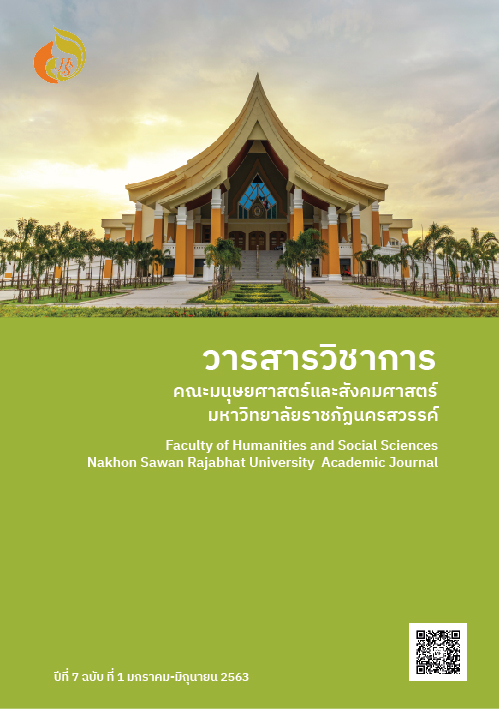Leadership Style and Success of Tourism Operators in the Northern Region
Main Article Content
Abstract
The research aims 1) to study leadership style of tourism operators in the Northern Region, 2) to study success factors of tourism operators in the Northern Region, 3) to compare the success of tourism operators in the Northern Region classified by personal factors, and 4) to compare the success of tourism operators in the Northern Region classified by leadership style. A total sample of 162 tourism operators, who are operating tourism business in the Northern Region. Questionnaire was employed as data collection tool. Statistics used included frequency, percentage, mean, standard deviation, Independent-Samples t-test, One-Way ANOVA, and Scheffe’s Method.
The result showed that most tourism operators in the Northern Region have transactional leadership, the overall success factors of tourism operators in the Northern Region are at high level, the tourism operators who have difference in age, monthly income, education, registered capital, and number of employees differently pay attention to the success of tourism operators in the Northern Region at 0.05 statistical significance level, particularly, the tourism operators, who are 61 years old and over, earn a monthly revenue of 150,001 Baht and over, complete a master’s degree, have registered capital of 2,000,001 Baht and over, and have 11-15 employees, pay relatively more attention to the success than other groups, and the tourism operators who have difference in leadership style differently pay attention to the success of tourism operators in the Northern Region at 0.05 statistical significance level. Particularly, the tourism operators who have a transformation leadership style pay relatively more attention to the success than those having other styles.
Article Details
References
ธีรพร สุทธิโส. (2550). การรับรู้วัฒนธรรมองค์การ ความผูกพันต่อองค์การ และพฤติกรรมการทำงานของพนักงานโรงงานผลิตรถจักรยานยนต์ (วิทยานิพนธ์มหาบัณฑิต). กรุงเทพฯ: มหาวิทยาลัยเกษตรศาสตร์.
เบญจมาศ โรจน์ธนกิจ. (2546). ความสัมพันธ์ระหว่างการรับรู้ความสามารถของตนเอง วัฒนธรรมองค์การ ความยุติธรรมในองค์การกับผลการปฏิบัติงาน (วิทยานิพนธ์มหาบัณฑิต). กรุงเทพฯ: มหาวิทยาลัยเกษตรศาสตร์.
ปิยะนุช มีเหว่าพันธ์. (2556). ลักษณะของอุตสาหกรรมและธุรกิจท่องเที่ยว. สืบค้น 30 กรกฎาคม 2561, จาก https://chaisupar3.wordpress.com/ความเป็นมาและความสำคัญ/.
วรรณสิริ โมรากุล. (2558). ท่องเที่ยวทุบสถิติรอบ 8 ปี ถึง 29.5 ล้านคน รวม 1.4 ล้านล้านบาท. สืบค้น 30 กรกฎาคม 2561, จากhttps://mgronline.com/business/detail/9580000122988.
สำนักงานพัฒนาการท่องเที่ยว กระทรวงการท่องเที่ยวและกีฬา. (2551). รายงานสรุปสถานการณ์โรงแรมและการท่องเที่ยวภายในประเทศ. กรุงเทพฯ: ม.ป.พ.
สุภัทราภรณ์ สุโข. (2548). ผลกระทบของวัฒนธรรมองค์การที่มีผลต่อศักยภาพในการแข่งขันของวิสาหกิจขนาดกลางและขนาดย่อมในเขตภาคตะวันออกเฉียงเหนือ (วิทยานิพนธ์มหาบัณฑิต). มหาสารคาม: มหาวิทยาลัยมหาสารคาม.
Bass, B. M. and Avolio, B. J. (1990). Transformational leadership development: Manual for the multifactor leadership questionnaire. Palo Alto, California: Consulting Psychologists Press.
Bass, B. M., and Avolio, B. J. (1994). Improving Organizational Effectiveness: Through Transformational Leadership. California. CA: Sage Publications. Inc.
Cochran, W.G. (1953). Sampling techniques. New York: John Wiley & Sons. Inc.
House, R. J., Hanges, P.J., Javidan, M., Dorfman, P.W., and Gupta, V. (2004). Culture, leadership, and organizations: The GLOBE study of 62 societies. Thousand Oaks, CA: Sage Publications. Inc.
Mesh, N., Huynh, M. Q., and Jessup, L. (2005). Creating successful entrepreneurial ventures in It. Communications of the ACM, , 48 (6), pp. 82-87.
P. J. Gardiner Institute for Enterprise and Entrepreneurship. (2003). Built to last entrepreneurial success stories of Newfoundland and Labrador. (Online) Retrieved July 30, 2018, from https://www.gov.nl.ca/publicat/royalcomm/research/Gardiner.pdf
Phinit Kotakarn. (2559). ผู้นำและภาวะผู้นำ...กับความสำเร็จขององค์การ. สืบค้น 30 กรกฎาคม 2561, จาก http://phinit0112.blogspot.com.


